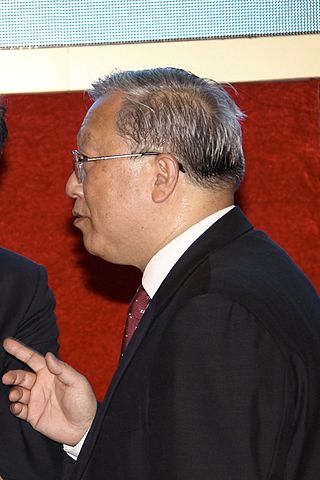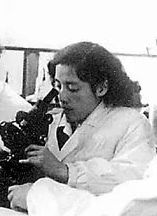Related Research Articles

China Agricultural University (CAU) is a public university in Haidian, Beijing, China. The university is affiliated with the Ministry of Education of China. It is part of Project 211, Project 985, and the Double First-Class Construction.

Lu Yongxiang is a Chinese mechanical engineer and politician. He served as President of the Chinese Academy of Sciences and Vice Chairman of the National People's Congress.

The 82nd Group Army, Unit 31677, formerly the 38th Group Army, is a military formation of the Chinese People's Liberation Army Ground Force (PLAGF). The 82nd Group Army is one of thirteen total group armies of the PLAGF, the largest echelon of ground forces in the People's Republic of China, and one of three assigned to the nation's Central Theater Command.

The Ministry of Industry and Information Technology (MIIT) is the sixth-ranked executive department of the State Council of the People's Republic of China. It is responsible for regulation and development of the postal service, Internet, wireless, broadcasting, communications, production of electronic and information goods, software industry and the promotion of the national knowledge economy.

Du Runsheng was a Chinese military officer, revolutionary leader, politician, and economist. He has been hailed as "China's father of rural reform". From 1982 to 1986, he drew up the annual "Document No.1 of the Central Government" about rural reform, which promoted the development of rural areas. Du's students included Wang Qishan, Justin Yifu Lin, Zhou Qiren, Wen Tiejun, Wang Xiaoqiang, Chen Xiwen, Zhang Musheng, Du Ying and Weng Yongxi.

Liu Guozhong is a Chinese politician and a member of the Politburo of the Chinese Communist Party who has served as a vice premier of China since March 2023.
The 195th Heavy Combined Arms Brigade is a maneuver formation of People's Liberation Army Ground Force which serves as an opposing force unit in exercises.
The 7th Division is a division of the Xinjiang Production and Construction Corps (XPCC) based in Ili Kazakh Autonomous Prefecture and Karamay City, Xinjiang Uygur Autonomous Region, China. It is an economic and paramilitary unit formed in 1953 from the former 25th Infantry Division of the 9th Army of the 22nd Corps of the PLA. The 7th Agricultural Construction Division of the XPCC was approved and renamed to the present 7th Division of the XPCC in 2012. The division is composed of 10 regiments and a direct managed farm, and headquartered in Kuytun City.
The 8th Division is a division of the Xinjiang Production and Construction Corps (XPCC) distributed over Shihezi and Karamay cities, Manas and Shawan counties, Xinjiang Uygur Autonomous Region, China. It is an economic and paramilitary unit formed in 1953 from the former 26th Infantry Division of the 9th Army of the 22rd Corps of the PLA. The 8th Agricultural Construction Division was approved and renamed to the present 8th Division of the XPCC in 2012. The division is composed of 14 regiments, and headquartered in Shihezi City, it merges work in one official with Shihezi City. The Shihezi Reclamation Area of the 8th Division has an area of 5,851 square kilometers with a total population of 696,900 and a permanent population of 661,300, of that, the Shihezi City has an area of 460 square kilometers with a total population of 448,100 and a permanent population of 437,900. In the year of 2018, GDP of the 8th Division was CN¥54.85 billion, and the GDP per capita CN¥82,584 (US$12,480).
Xi'an University of Technology is a provincial public comprehensive university in Xi'an, Shaanxi, China. The university is co-sponsored by the Ministry of Industry and Information Technology and the Shaanxi Provincial Government.
Tu Shandong is a Chinese engineer specializing in machinery and power engineering. He is an academician of the Chinese Academy of Engineering (CAE) and formerly served as vice-president of East China University of Science and Technology. He is an honorary professor at the University of Nottingham, a member of the International Federation for the Promotion of Mechanism and Machine Science (IFToMM) and the Chinese Mechanical Engineering Society (CMES).
Jiang Yiyuan was a Chinese agricultural engineer and academician of the Chinese Academy of Engineering (CAE). He was a member of the Chinese Society for Agricultural Machinery and Chinese Society of Agricultural Engineering.
Zhou Huijiu is a Chinese scientist specializing in metallic materials, heat treating and mechanical properties. He was an academician of the Chinese Academy of Sciences.
Zhao Chunjiang is a Chinese engineer who is the director of National Engineering Research Center for Information Technology in Agriculture, and an academician of the Chinese Academy of Engineering.

Chen Wenxin was a Chinese biologist specializing in soil microorganisms and bacterial taxonomy, and an academician of the Chinese Academy of Sciences. Some English-language sources cite her as "Wen Xin Chen" or as "Wen-Xin Chen".
Wen Tiejun is a Chinese agricultural economist who is a professor at the Renmin University of China.

Mikio Umeda is a Japanese inventor and scientist in the fields of precision agriculture, field robotics and agricultural robot. He is also one of leading international experts in agricultural development strategies in Asia. He is currently serving as Professor emeritus of Kyoto University, Associate Council Member of the Science Council of Japan and Honorary President of CIGR.
Gu Xinyi was a Chinese petroleum and mining machinery engineer, and an academician of the Chinese Academy of Engineering.
Established in 1917, the China Association of Agricultural Science Societies, or Chinese Society of Agriculture is the oldest agricultural science and technology organization in China, serving as both a witness to and a proponent of the advancement of modern agricultural science and technology in the country.

Liu He, better known by his courtesy name as Liu Xianzhou, was a Chinese educator, mechanical engineer and member of the Chinese Academy of Sciences.
References
- ↑ Zheng, Caixiong (17 March 2020). "Venerable professor shares wisdom on rice". China Daily. Retrieved 3 July 2021.
- 1 2 3 4 5 Wang Yanhong (王艳红) (30 March 2021). 罗锡文院士:咬定青山不放松,甘为农机付一生. Sohu (in Chinese). Retrieved 3 July 2021.